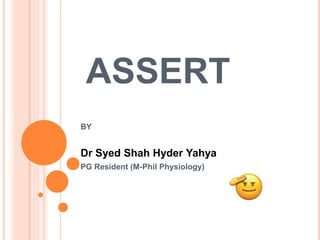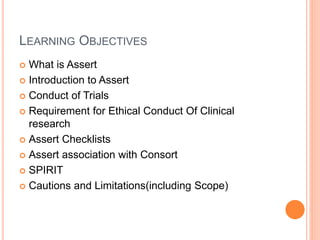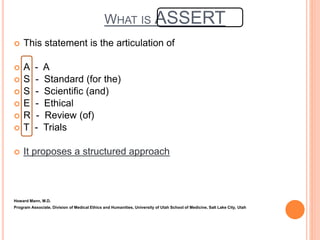Assert
- 1. ASSERT BY Dr Syed Shah Hyder Yahya PG Resident (M-Phil Physiology)
- 3. LEARNING OBJECTIVES ïĒ What is Assert ïĒ Introduction to Assert ïĒ Conduct of Trials ïĒ Requirement for Ethical Conduct Of Clinical research ïĒ Assert Checklists ïĒ Assert association with Consort ïĒ SPIRIT ïĒ Cautions and Limitations(including Scope)
- 4. SOME TERMS ïĒ CONSORT (CONsolidated Standards Of Reporting Trials) ïĒ STRICTA (STandards for Reporting Interventions in Clinical Trials of Acupuncture) ïĒ TREND (Transparent Reporting of Evaluations with Nonrandomized Designs) ïĒ STROBE (STrengthening the Reporting of OBservational studies in Epidemiology) ïĒ STARD (STAndards for Reporting of Diagnostic Accuracy Studies) ïĒ SURGE (The SUrvey Reporting GuidelinE) ïĒ PRISMA (Preferred Reporting Items for Systematic Reviews and Meta-Analyses)
- 5. WHAT IS ASSERT ïĒ This statement is the articulation of ïĒ A - A ïĒ S - Standard (for the) ïĒ S - Scientific (and) ïĒ E - Ethical ïĒ R - Review (of) ïĒ T - Trials ïĒ It proposes a structured approach Howard Mann, M.D. Program Associate, Division of Medical Ethics and Humanities, University of Utah School of Medicine, Salt Lake City, Utah
- 6. INTRODUCTION TO ASSERT ïĒIt represents a Declaration and Elaboration of the necessary requirements for the Ethical conduct of human subject research in the form of Randomized Controlled Clinical Trials ïĒ A proposal intended to operationalize these percepts in the context of review of proposals for trials by RESEARCH ETHIC COMMITTES
- 7. CONDUCT OF CLINICAL TRIALS ïĒ Each years Thousands of RCT ( Randomized controlled trials) are performed worldwide ïĒ Theses involves ï 1- Marketed drugs or investigational agents ïĒ ( active agent or placebo) ï 2- Other Medical interventions ïĒ ( Surgical procedures and radiation therapy) So the results of clinical trials are of considerable importance in many interrelated health care contexts Guidance for Industry. Providing Clinical Evidence of Effectiveness for Human Drug and Biological Products. F.D.A. May 1998.
- 8. REQUIREMENT ïĒ In year 2000 few of the researchers enumerated SEVEN universally applicable requirements for the Ethical Conduct of Clinical Research ï 1- Social and scientific value ï 2- Scientific validity ï 3- Fair subject selection ï 4- Favorable risk benefit ratio ï 5- Independent review ï 6- Informed consent ï 7- Respect for potential and current research subject Emanuel EJ, Wendler D, Grady C. What makes clinical research ethical? JAMA 2000; 283:2701-2717
- 14. ASSERT ASSOCIATION WITH CONSORT ïĒThe ASSERT checklist is modeled directly on the CONSORT concept of identifying and elaborating on specific items known to be crucial in evaluating the reports of controlled trials Guidelines for Reporting Health Research: A Userâs Manual
- 15. NOTE
- 16. ïĒ The ASSERT statement is no longer under development ïĒ It has been included into the SPIRIT(Standard Protocol Items : Recommendations for Interventional Trials)
- 17. SPIRIT ïĒThe SPIRIT statement contain guidance for authors of protocols for randomized and non randomized clinical trials
- 18. SPIRIT IS A 33 ITEMS CHECKLIST ïĒ Which further divided into 5 broad sections ï 1- Covering Administrative Information (5 items) ï 2- The Introduction (3 items) ï 3- Methods (15 items) ï 4- Ethics and Dissemination (8 items) ï 5- Appendices (2 items)
- 19. Extensions or implementations ïĒ No extensions or implementations of SPIRIT 2013 have been published to date. ïĒ However, a similar initiative is under development for protocols of systematic reviews â the PRISMA-P statement The PRISMA-P statement aims to help authors draft protocols of systematic reviews (item 5, PRISMA checklist) and to facilitate their registration PROSPERO
- 20. CAUTIONS AND LIMITATIONS(INCLUDING SCOPE) ïĒ 1- It is not a tool to help reader asses the quality of clinical trial protocols ïĒ 2- It is also not intended to be used for reporting a completed clinical trial ï ( author should use CONSORT 2010) ïĒ 3- It is the minimum standard that is broadly applicable to all types of clinical trials regardless of study design, intervention or topic
- 21. Q & A ???






















